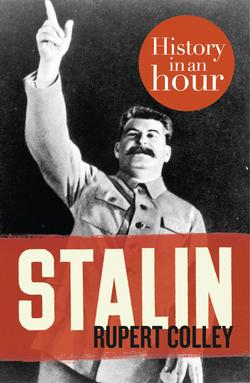Читать книгу Stalin: History in an Hour - Rupert Colley - Страница 7
ОглавлениеThe Young Stalin
Joseph Stalin suffered many complexes about himself. As a child he endured a bout of smallpox which left his face permanently pockmarked; a childhood accident caused his left arm to be four inches shorter than the right; his second and third toes of his left foot were joined; he had bad teeth from his many years in exile (‘black, irregular and turned inward’ by one description); and, most damning for such a towering figure, he was only five feet and three inches tall. Specially-made shoes gave him an extra inch or two but his height, or lack of it, remained a constant source of irritation.
Stalin was born Joseph Vissarionovich Dzhugashvili in the small Georgian town of Gori, Georgia at the time being part of the Imperial Russian Empire, an empire constrained by feudalism and ruled by the autocratic and unpopular Romanov dynasty. His date of birth was the 18 December 1878 but for reasons that remain a mystery, Stalin always maintained he was born on 21 December 1879 and it is this date that was celebrated throughout his life.
Stalin’s father, Vissarion Dzhugashvili, known as Basu, was a shoemaker. An alcoholic, he spent much of his time in Tiflis (now Tbilisi, the Georgian capital, 50 miles east of Gori) producing shoes for the Russian army. On his drunken and increasingly rare appearances at home, he would beat his wife and son. Stalin’s mother, Ekaterina, or ‘Keke’, also meted out punishment on her son but generally was protective of her ‘Soso’ (Georgian for ‘Little Joey’), especially as her first two children, both boys, had died in infancy. Stalin only learnt to speak Russian when aged about nine and he never lost his strong Georgian accent.
Stalin aged 15, 1894
Stalin was brought up in an atmosphere of violence. Gori was a rough town, in which its male inhabitants enjoyed organized street brawling, lasting for hours at a time. On 13 February 1892, Stalin, alongside his schoolmates, witnessed the public hanging of two criminals. The executions were botched and Stalin, traumatised, came away with a new-found hatred of the tsarist regime.
Stalin’s mother, determined that he should have a respectable position in life and to repay God’s benevolence for his survival, sent him to a church school. Young Soso did well. He sang in the church choir and impressed his teachers with his intelligence and, in memorising large tracts of the bible, his excellent memory. Earning top marks, he graduated two years ahead of schedule in 1894. At the age of fifteen, Stalin was awarded a scholarship to the theology seminary in Tiflis. But the teenage Stalin was more taken with the writings of Marx and Engels than the bible and, declaring himself a Marxist and an atheist, joined the Russian Social Democratic Labour Party (RSDLP), extolling his fellow students at the seminary to do likewise.
